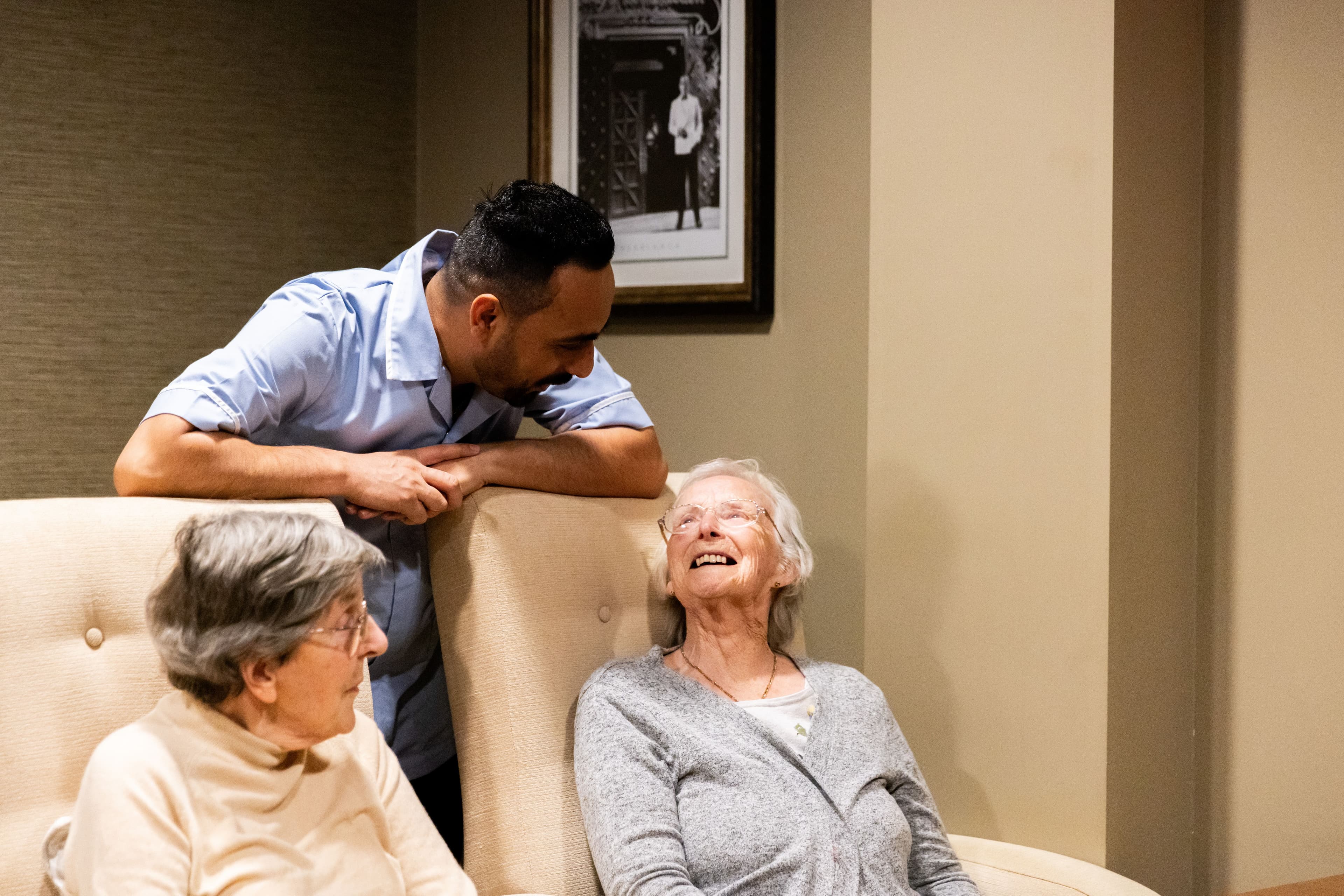Your free guide to finding nursing care.
Get your own personal list of nursing care options in moments. For free.
Used by over
18,000 families every month
How does Lottie help families find the right care?
Find the right nursing home in just three simple steps...

1
Personalise your search
Tell us your later living needs, wants and budget, as well as your preferred location and estimated move-in date.

2
Compare homes
Lottie will send you a tailored shortlist of your most compatible nursing homes with availability.

3
Enquire directly
Once you've found your perfect match, enquire directly, or request further support from Lottie's team of care experts.
Start your nursing home search today!
Enter your location to compare recommended nursing homes near you.
What's the difference between a care home and a nursing home?

Nursing home
A nursing home has registered nurses on hand 24 hours a day, along with carers, to support residents who need regular medical care – such as managing a health condition, having injections, or help with wound care – as well as everyday tasks like washing and dressing. If nursing care isn’t needed, a care home might be a better fit.

Care home
A care home offers 24-hour support from friendly, trained carers with daily tasks like getting washed, dressed, eating and moving around. There aren’t nurses on site, so it’s best for people who don’t need regular medical treatment but do need a bit of extra help to stay safe and comfortable.
Why families trust Lottie to find nursing care
Proudly rated the UK’s number one service in Trustpilot’s “Aged Care” category, Lottie helps over 40,000 families match with care every month.

Free expert support
Lottie’s team of Care Experts offer a completely free service, to help you find the right nursing care, access funding and feel less alone.

Pricing transparency
Request detailed pricing for nursing homes in your area, with full transparency on costs across care types, locations, and providers.

Free personalised shortlist
Get a free, personalised shortlist of recommended nursing homes - expertly matched to your needs.
Other types of care explained
We know that choosing the right care home is an important decision. We're here to help you find trusted, high-quality care tailored to your needs.

Residential care
Support with everyday tasks like washing, dressing and mealtimes, provided by trained carers. A good option for those who need day-to-day help but don’t require nursing or specialist dementia care.

Dementia care
Specialist care for people living with mid to late stage dementia. Staff are trained to provide safe, structured, and compassionate care tailored to each person’s needs.

Respite care
Respite care offers short-term stays in a care home, often for recovery, carer breaks, or to trial a longer-term stay. It’s a flexible way to experience life in a care home without committing to a permanent move.
Advice from Lottie’s team of care experts
From understanding medical support to choosing the right nursing home, our expert nursing care advice is reviewed by Lottie’s care experts to help you feel confident and informed.
Testimonials from Lottie's care seekers
Choosing the right nursing home is a big decision, and we’re here to support you - just like we have for many others. See what they have to say…
Lottie helped us compare nursing homes. We chose one they suggested. A wonderful, professional service!
Pat
9th April 2025
The information and advice I received from Lottie was so helpful. I can't thank them enough. I came off the phone clearly knowing the care options for my dear mum.
Sue
19th February 2025
Lottie is the 1st organisation I have come across who have been willing to understand and help.
Jacqueline
23rd January 2025
Fantastic advisor, who clearly knows the hurdles and issues that need navigating, and was extremely understanding and sympathetic. Brilliant service!
Paul
15th January 2025
Klara gave me questions to ask nursing homes and explained funding for my mum with dementia. Extremely helpful and kind.
SC
Absolutely amazing service. Couldn't have asked for more support. Thanks so much Eva you've made such a difference to what could have been a really stressful process.
Stuart
12th November 2024
Only homes with vacancies shown—no time wasted. Everything in one place. Would recommend for anyone needing a nursing home.
Stephen
5th October 2024
Frequently asked questions about nursing homes
How much does a nursing home cost?
On average, nursing care in the UK costs £1,558 per week or £6,751 per month.
You can read our full guide to care home costs in the UK.
What’s the difference between residential care and nursing care?
The main difference between residential care and nursing care is the level of medical help on offer. Residential care homes support people with everyday tasks like washing, dressing, and enjoying meals and activities, but they don’t have nurses on-site. They’re a good fit for those who need some day-to-day help but not ongoing medical care. Nursing homes provide the same personal care but with trained nurses available 24/7. This makes them more suitable for people living with health conditions that need regular monitoring or medical attention, like after a hospital stay, or for those living with dementia or long-term conditions such as Parkinson’s.
When is nursing care appropriate?
Nursing care in a care home is suitable when someone has a medical condition that requires regular attention from trained nurses, either short-term or long-term. This might include ongoing care for conditions like dementia, Parkinson’s, or after a stroke, as well as support with recovery after surgery or help with managing medication and wound care. If you or a loved one needs round-the-clock medical support, especially alongside help with daily tasks, a nursing home can provide the right level of care in a safe and comfortable setting.
Can you get nursing care for free?
You might be able to get help with nursing care costs through NHS-funded nursing care, which covers the nursing part of your care home fees. The NHS pays a set weekly amount directly to the care home if you’re eligible.
To qualify, you must live in a nursing home and have been assessed as needing care from a registered nurse, but not be eligible for full NHS Continuing Healthcare (which is another form of NHS funding that fully covers the cost of a care home). Most people are assessed for this automatically, but if not, your local Integrated Care Board (ICB) can arrange it.
NHS-funded nursing care doesn’t cover your full care home costs (like accommodation or meals), but it does reduce what you pay overall. If your care is funded by the local authority, the NHS contribution is passed to them. If you’re paying privately, your fees should be lowered by the NHS amount.
If your needs change – for example, if you no longer require nursing care or move to a different type of home – the funding may stop.
Can social services put someone into a nursing home?
In most cases, no. If you have the mental capacity to make decisions about your own care, social services cannot force you into a nursing home or care home, even if they believe it’s the best option.
However, if someone is unable to make decisions for themselves and their needs aren't being safely met at home, social services can arrange a move into a care home in their best interests. This would only happen after a full assessment, and other care options would be considered first.
What types of medical conditions are supported in a nursing home?
Nursing homes provide specialist care for a wide range of health conditions, whether short-term or ongoing. They're especially suited to people who need regular medical support from trained nurses, alongside help with everyday tasks.
Some of the conditions nursing care can support include:
- Post-stroke care – For those recovering from the effects of a stroke, with support to regain strength and independence.
- Neurological disorders – Such as Parkinson’s, Huntington’s disease, Motor Neurone Disease and ALS. These conditions often need round-the-clock monitoring as symptoms progress.
- Long-term health conditions and physical disabilities – Like arthritis, multiple sclerosis or spinal cord injuries, where daily care and mobility support are essential.
- Rehabilitation after illness or injury – For those who aren’t ready to return home straight away and need short-term nursing care to support their recovery, including through convalescent care.
- Palliative care – Compassionate care that encompasses end-of-life care focused on comfort, dignity and quality of life for those with terminal illnesses.
Are nursing homes more expensive than a residential care home?
Yes, nursing homes are typically more expensive than residential care homes. This is because they provide 24-hour medical care from qualified nurses, in addition to the personal care and daily living support offered in residential care. If someone has been assessed as needing nursing care, the NHS may contribute towards the nursing part of the fees, which can help reduce the overall cost. The average weekly cost of a nursing home in the UK is £1,558, compared to £1,406 for a residential care home.
What is life like in a nursing home?
Moving into a nursing home is a big step, and it’s completely natural to wonder what everyday life will look and feel like — especially if your loved one is living with complex health needs.
While clinical care is at the heart of a nursing home, life isn’t only about medication and routines — it’s about creating a sense of comfort, familiarity, and dignity for every resident.
Each person has their own private space, often with room for personal belongings that bring comfort — whether that’s a favourite armchair, family photos, or a familiar blanket. Care plans are tailored, meaning support is adapted around individual needs, whether that’s daily nursing care, mobility support, or help with personal routines.
But there’s also time for connection, conversation, and enjoyment. Residents are encouraged to take part in gentle activities, from music and crafts to time in the garden or simply having a cup of tea in the lounge. Meals are shared in a social setting, often freshly prepared and tailored to personal tastes.
Family visits are welcomed, and many homes go out of their way to involve relatives in care planning and day-to-day life — helping residents stay connected to what matters most.
Who provides nursing care in a care home?
Nursing care is provided by registered nurses who are supported by teams of experienced care staff. These nurses are trained to deliver medical care such as wound management, administering medication, monitoring health conditions, and supporting people with long-term or complex needs. The care team will also help with everyday tasks like personal care, meals, and mobility — all with compassion and patience.
All nursing homes in the UK are regulated by the Care Quality Commission (CQC) or the equivalent body in Scotland, Wales or Northern Ireland and are regularly inspected to ensure they meet high standards of safety and care.
How do I know if my loved one needs a nursing home?
There’s no one-size-fits-all answer — but if your loved one has regular medical needs that go beyond what can be safely managed at home or in a residential care setting, a nursing home might be the right step.
You might notice increasing issues with mobility, complex medication routines, difficulty managing chronic conditions, or the need for more specialist dementia support. If caring at home has become too difficult or unsafe, it may be time to explore round-the-clock care in a setting with trained nursing staff.
What medical conditions are supported in a nursing home?
Nursing homes are specially equipped to support people living with more complex health conditions — both physical and neurological. This includes advanced dementia, Parkinson’s disease, stroke recovery, multiple sclerosis, long-term mobility challenges, and recovery after hospital stays.
Some nursing homes also provide specialist support for palliative care, PEG feeding, wound care, or cancer-related needs. Every resident has a personalised care plan, and nurses are trained to respond to changing health needs with expertise and compassion.
Can I visit my loved one in a nursing home?
Yes — and for many families, knowing they can visit freely brings huge peace of mind. Most nursing homes offer flexible visiting hours, and many have quiet lounges or private spaces so you can spend time together in comfort. Whether it’s a cup of tea in their room, joining them for lunch, or bringing in a family photo album, visits are a chance to stay close and connected. Exact visiting hours vary from home to home, so be sure to check ahead of time.
Care teams also regularly update you and often involve families in planning and decisions, so you always feel part of your loved one’s care journey.
Looking for a specific provider?
Nursing care trends and insights from Lottie
Insights from Lottie’s nursing care search and enquiry data, revealing what matters most to care seekers and their families.
Many people need nursing care urgently
If you're searching for nursing care on a tight timeline, you're not alone. Around 60% of people need an immediate move-in, and 90% are hoping to arrange care within the next 3 months. Whether it’s after a hospital stay or due to a sudden change in health, needing immediate care is incredibly common, and we’re here to help you make the right decision quickly and with confidence.
Request your free nursing care shortlist to get help finding nursing care with availability now.
One in four people are looking for short-term nursing care
25% of those searching for nursing care are looking for short-term support - often to recover after a hospital stay, an illness, or to give a family carer a break. Respite nursing care offers expert support without the pressure of long-term commitment.
Request a free shortlist of homes offering short-term nursing care.
Many people are searching for nursing care with specialist support
Nursing care isn’t one size fits all, and you're not alone if you're looking for something specific. Many care seekers are searching for nursing homes that can support more complex needs, including dementia, palliative care, physical disabilities, or a condition such as Parkinson’s.
Whether you’re arranging care after a hospital stay or managing a long-term condition, it’s completely normal to need tailored support, and the right home will be equipped to provide it.
To get started, use our care home search tool and filter for the specialist support you need.
Expert advice: how to choose a nursing home
As a qualified nursing care adviser - and someone who's supported families navigating complex health needs - I know that deciding a loved one needs nursing care can feel daunting. These three steps can help guide you through the process with confidence:
Understand your nursing care needs. Nursing care is for individuals who need regular medical support from qualified nurses - whether managing long-term conditions, recovering from surgery, or requiring 24-hour clinical supervision. If you're unsure, a care needs assessment can help clarify what level of care is best.
Explore and compare nursing homes. Use Lottie to search for homes with qualified nursing teams, detailed clinical care options, and up-to-date inspection ratings. This makes it easier to find homes that meet both current and potential future needs.
Ask lots of questions. Find out how medication is managed, whether 24/7 nursing cover is provided, and how care plans are regularly reviewed. Ask about the nurse-to-resident ratio, staff expertise in complex conditions, and how the home works with local GPs or hospitals.
-Hannah Karim, Customer Care Lead at Lottie.
















